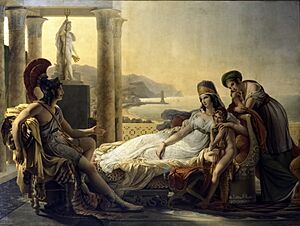Dido facts for kids

| This article contains special characters. Without the correct software, you may see question marks, boxes, or other symbols. |
Dido, also known as Elissa (ə-LISS-ə, Ἔλισσα), was a legendary queen who founded the powerful ancient city of Carthage. This city was located in what is now Tunisia, in North Africa. Stories say she started Carthage around 814 BC.
Most accounts describe Dido as a queen from the Phoenician city of Tyre (located in Lebanon). She reportedly fled from a cruel ruler to create her own city in northwest Africa. We know about Dido mostly from ancient Greek and Roman writings. These stories were written long after Carthage was founded, so it's not certain if she was a real person or a legend. The oldest mentions of Dido come from a historian named Timaeus, who lived around 300 BC. This was about 500 years after Carthage was supposedly founded.
Dido's Story
Timaeus shared the legends about Dido founding Carthage in his book, Sicilian History. According to him, Dido founded Carthage in 814 BC. This was around the same time that the city of Rome was founded. Timaeus even hinted at the future conflicts between Carthage and Rome that were happening in his own time.
Dido in the Aeneid
The most famous details about Dido's life and her role in founding Carthage come from Virgil's epic poem, the Aeneid. Virgil wrote this poem around 20 BC. It tells the legendary story of the Trojan hero Aeneas.
In the Aeneid, Dido is shown as a very smart and brave woman. She escapes from her cruel brother, Pygmalion. She discovers that he was responsible for the death of her husband. Dido is also described as a wise leader. She successfully founds Carthage and helps it become a rich and strong city.
Dido's Legacy
Dido has remained an important figure in Western culture and art. People have created art and stories about her from the early Renaissance period all the way into the 21st century. In the early 1900s, Dido became a national symbol for Tunisia. Even today, Tunisian women are sometimes poetically called "Daughters of Dido."
See also
 In Spanish: Dido para niños
In Spanish: Dido para niños
 | Leon Lynch |
 | Milton P. Webster |
 | Ferdinand Smith |

